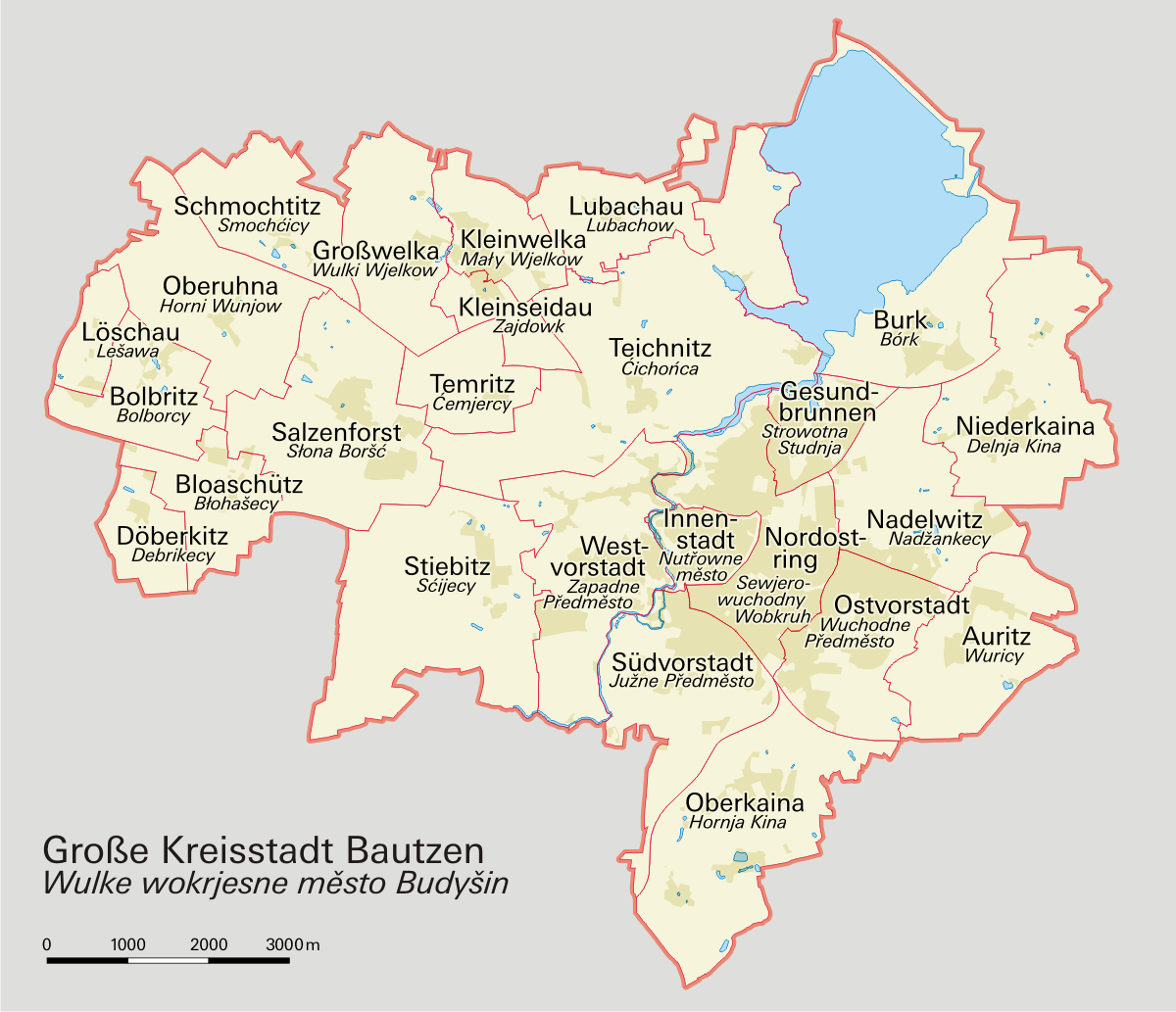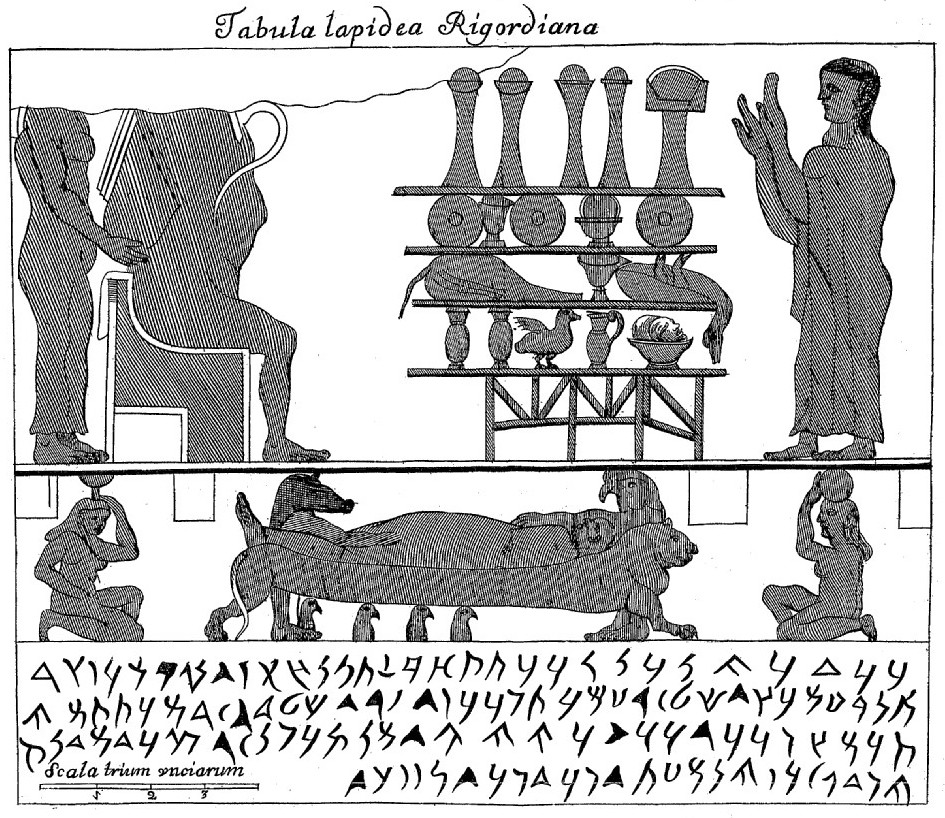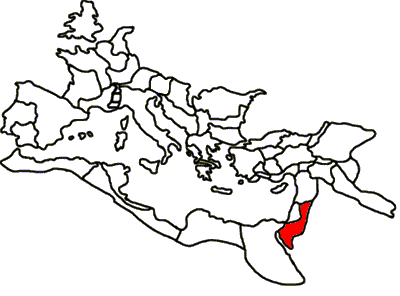|
Eduard Friedrich Ferdinand Beer
Eduard Friedrich Ferdinand Beer (June 15, 1805 in Bautzen – April 5, 1841 in Leipzig) was a German orientalist, epigraphist and paleographer. He was the decipherer of the Nabataean script, known at the time as the Sinaitic script. He died destitute at just 35 years old, possibly of starvation-related conditions. Life Eduard Friedrich Ferdinand Beer was born on June 15, 1805, in Bautzen, the son of the tailor Leonhard Beer (1775–1827) and his wife Erdmuthe Eleonora Dorothea, who was born in 1785, and the daughter of the tailor Gottlieb Apelt (1753–1805) and his wife Rosina Dorothea Friese (1761–1810). Beer had been interested in languages since childhood. From 1817 he attended a high school in his hometown. Two years later he began to learn the Hebrew language, but also dealt with the Semitic languages in general. Because his father died in 1827, Beer had problems financing his studies, so he worked as a proofreader on the side, despite a serious illness in 1828. ... [...More Info...] [...Related Items...] OR: [Wikipedia] [Google] [Baidu] |
Bautzen
Bautzen () or Budyšin () is a hill-top town in eastern Saxony, Germany, and the administrative centre of the district of Bautzen. It is located on the Spree river. In 2018 the town's population was 39,087. Until 1868, its German name was ''Budissin''. In 1945 the Battle of Bautzen was Hitler’s last victory against the Soviet Union during the Battle of Berlin . Bautzen is often regarded as the unofficial, but historical capital of Upper Lusatia. The town is also the most important cultural centre of the Sorbian minority, which constitutes about 10 percent of Bautzen's population. Asteroid '' 11580 Bautzen'' is named in honour of the city. Names Like other cities and places in Lusatia, Bautzen has several different names across languages. Its German name was also officially changed in 1868. As well as ''Bautzen'' (German) and ''Budyšin'' (Upper Sorbian), the town has had the following names: * German: ''Budissin'' (variants used from c. 11th century onwards; Saxon governme ... [...More Info...] [...Related Items...] OR: [Wikipedia] [Google] [Baidu] |
Cuneiform
Cuneiform is a logo-syllabic script that was used to write several languages of the Ancient Middle East. The script was in active use from the early Bronze Age until the beginning of the Common Era. It is named for the characteristic wedge-shaped impressions (Latin: ) which form its signs. Cuneiform was originally developed to write the Sumerian language of southern Mesopotamia (modern Iraq). Cuneiform is the earliest known writing system. Over the course of its history, cuneiform was adapted to write a number of languages in addition to Sumerian. Akkadian texts are attested from the 24th century BC onward and make up the bulk of the cuneiform record. Akkadian cuneiform was itself adapted to write the Hittite language in the early second millennium BC. The other languages with significant cuneiform corpora are Eblaite, Elamite, Hurrian, Luwian, and Urartian. The Old Persian and Ugaritic alphabets feature cuneiform-style signs; however, they are unrelated to the cuneiform lo ... [...More Info...] [...Related Items...] OR: [Wikipedia] [Google] [Baidu] |
German Palaeographers
German(s) may refer to: * Germany (of or related to) **Germania (historical use) * Germans, citizens of Germany, people of German ancestry, or native speakers of the German language ** For citizens of Germany, see also German nationality law **Germanic peoples (Roman times) * German language **any of the Germanic languages * German cuisine, traditional foods of Germany People * German (given name) * German (surname) * Germán, a Spanish name Places * German (parish), Isle of Man * German, Albania, or Gërmej * German, Bulgaria * German, Iran * German, North Macedonia * German, New York, U.S. * Agios Germanos, Greece Other uses * German (mythology), a South Slavic mythological being * Germans (band), a Canadian rock band * "German" (song), a 2019 song by No Money Enterprise * ''The German'', a 2008 short film * "The Germans", an episode of ''Fawlty Towers'' * ''The German'', a nickname for Congolese rebel André Kisase Ngandu See also * Germanic (other) * Germa ... [...More Info...] [...Related Items...] OR: [Wikipedia] [Google] [Baidu] |
Academic Staff Of Leipzig University
An academy ( Attic Greek: Ἀκαδήμεια; Koine Greek Ἀκαδημία) is an institution of secondary or tertiary higher learning (and generally also research or honorary membership). The name traces back to Plato's school of philosophy, founded approximately 385 BC at Akademia, a sanctuary of Athena, the goddess of wisdom and skill, north of Athens, Greece. Etymology The word comes from the ''Academy'' in ancient Greece, which derives from the Athenian hero, '' Akademos''. Outside the city walls of Athens, the gymnasium was made famous by Plato as a center of learning. The sacred space, dedicated to the goddess of wisdom, Athena, had formerly been an olive grove, hence the expression "the groves of Academe". In these gardens, the philosopher Plato conversed with followers. Plato developed his sessions into a method of teaching philosophy and in 387 BC, established what is known today as the Old Academy. By extension, ''academia'' has come to mean the accumulatio ... [...More Info...] [...Related Items...] OR: [Wikipedia] [Google] [Baidu] |
1805 Births
Eighteen or 18 may refer to: * 18 (number), the natural number following 17 and preceding 19 * one of the years 18 BC, AD 18, 1918, 2018 Film, television and entertainment * ''18'' (film), a 1993 Taiwanese experimental film based on the short story ''God's Dice'' * ''Eighteen'' (film), a 2005 Canadian dramatic feature film * 18 (British Board of Film Classification), a film rating in the United Kingdom, also used in Ireland by the Irish Film Classification Office * 18 (''Dragon Ball''), a character in the ''Dragon Ball'' franchise * "Eighteen", a 2006 episode of the animated television series ''12 oz. Mouse'' Music Albums * ''18'' (Moby album), 2002 * ''18'' (Nana Kitade album), 2005 * '' 18...'', 2009 debut album by G.E.M. Songs * "18" (5 Seconds of Summer song), from their 2014 eponymous debut album * "18" (One Direction song), from their 2014 studio album ''Four'' * "18", by Anarbor from their 2013 studio album '' Burnout'' * "I'm Eighteen", by Alice Cooper common ... [...More Info...] [...Related Items...] OR: [Wikipedia] [Google] [Baidu] |
1841 Deaths
Events January–March * January 20 – Charles Elliot of the United Kingdom, and Qishan of the Qing dynasty, agree to the Convention of Chuenpi. * January 26 – Britain occupies Hong Kong. Later in the year, the first census of the island records a population of about 7,500. * January 27 – The active volcano Mount Erebus in Antarctica is discovered, and named by James Clark Ross. * January 28 – Ross discovers the "Victoria Barrier", later known as the Ross Ice Shelf. On the same voyage, he discovers the Ross Sea, Victoria Land and Mount Terror. * January 30 – A fire ruins and destroys two-thirds of the villa (modern-day city) of Mayagüez, Puerto Rico. * February 4 – First known reference to Groundhog Day in North America, in the diary of a James Morris. * February 10 – The Act of Union (''British North America Act'', 1840) is proclaimed in Canada. * February 11 – The two colonies of the Canadas are merged, into the United Province of Canada. * Febru ... [...More Info...] [...Related Items...] OR: [Wikipedia] [Google] [Baidu] |
Friedrich Stummer
Friedrich may refer to: Names *Friedrich (surname), people with the surname ''Friedrich'' *Friedrich (given name), people with the given name ''Friedrich'' Other *Friedrich (board game), a board game about Frederick the Great and the Seven Years' War * ''Friedrich'' (novel), a novel about anti-semitism written by Hans Peter Richter *Friedrich Air Conditioning, a company manufacturing air conditioning and purifying products *, a German cargo ship in service 1941-45 See also *Friedrichs (other) *Frederick (other) *Nikolaus Friedreich Nikolaus Friedreich (1 July 1825 in Würzburg – 6 July 1882 in Heidelberg) was a German pathologist and neurologist, and a third generation physician in the Friedreich family. His father was psychiatrist Johann Baptist Friedreich (1796–1862) ... {{disambig ja:フリードリヒ ... [...More Info...] [...Related Items...] OR: [Wikipedia] [Google] [Baidu] |
Carl Gustav Adolf Siegfried
Carl may refer to: * Carl, Georgia, city in USA * Carl, West Virginia, an unincorporated community *Carl (name), includes info about the name, variations of the name, and a list of people with the name * Carl², a TV series * "Carl", an episode of television series ''Aqua Teen Hunger Force'' * An informal nickname for a student or alum of Carleton College CARL may refer to: * Canadian Association of Research Libraries * Colorado Alliance of Research Libraries See also *Carle (other) *Charles Charles is a masculine given name predominantly found in English language, English and French language, French speaking countries. It is from the French form ''Charles'' of the Proto-Germanic, Proto-Germanic name (in runic alphabet) or ''*k ... * Carle, a surname * Karl (other) * Karle (other) {{disambig ja:カール zh:卡尔 ... [...More Info...] [...Related Items...] OR: [Wikipedia] [Google] [Baidu] |
Carpentras Stele
The Carpentras Stele is a stele found at Carpentras in southern France in 1704 that contains the first published inscription written in the Phoenician alphabet, and the first ever identified (a century later) as Aramaic. It remains in Carpentras, at the Bibliothèque Inguimbertine, in a "dark corner" on the first floor. Rudolf Jaggi, (2012) " completely wrong, stele found in Égypt (MemphisDer "Stein von Carpentras" Kemet: Die Zeitschrift für Ägyptenfreunde, volume 21, issue 1, p.58-61: "So landet man über kurz oder lang vor der Bibliothèque Inguimbertine. Der 1745 von Malachie d'Inguimbert gegründeten Bibliothek ist heute die Musée Comtadin-Duplessis angeschlossen, ein kleines Museum mit Volkskunst und Werken einheimischer Maler. Im ersten Stock des schönen Gebäudes findet sich in einer finsteren Ecke die alte Vitrine mit dem sog. Stein von Carpentras." Older Aramaic texts were found since the 9th century BC, but this one is the first Aramaic text to be published in Europe. ... [...More Info...] [...Related Items...] OR: [Wikipedia] [Google] [Baidu] |
Turin Aramaic Papyrus
The Turin Aramaic Papyrus, also known as Papyrus Taurinensis, is a fragment of an Aramaic papyrus found by Bernardino Drovetti in 1823–24. It is known as CIS II 144 and TAD A5.3. Although it contains just two lines, it is notable as the first published Aramaic inscription found in Egypt. It is held in Turin's Museo Egizio, with providence number 645. Publication and scholarly debate The first published reference was by Jean-François Champollion in June 1824, Wilhelm Gesenius, Scripturae Linguaeque Phoeniciae, p.233-6: "Non sine magno strepitu hoc fragmentum folii papyracei litteris Phoeniciovel certe Semitico-Aegyptiacis impleti inter Aegyptios Musei Turinensis papyros anno 1823 vel 1824 repertum viris doctis in universa Europa per ephemerides annunciatum est (v. Journal Asiatique T. V pag. 20), primum ab Hamakero (Miscell. phoen. tab. 3 no. 3) ex apographo Rochettiano editum; dein ex apographo a Gust. Seyffartho facto a Beerio in libello saepius memorato tab. 1: quod qui ... [...More Info...] [...Related Items...] OR: [Wikipedia] [Google] [Baidu] |
Nabataeans
The Nabataeans or Nabateans (; Nabataean Aramaic: , , vocalized as ; Arabic language, Arabic: , , singular , ; compare grc, Ναβαταῖος, translit=Nabataîos; la, Nabataeus) were an ancient Arab people who inhabited northern Arabian Peninsula, Arabia and the southern Levant. Their settlements—most prominently the assumed capital city of Petra, Raqmu (present-day Petra, Jordan)—gave the name ''Nabatene'' ( grc, Ναβατηνή, translit=Nabatēnḗ) to the Arabian borderland that stretched from the Euphrates to the Red Sea. The Nabateans emerged as a distinct civilization and political entity between the 4th and 2nd centuries BCE,Taylor, Jane (2001). ''Petra and the Lost Kingdom of the Nabataeans''. London: I.B.Tauris. pp. 14, 17, 30, 31. . Retrieved 8 July 2016. with Nabataean Kingdom, their kingdom centered around a loosely controlled trading network that brought considerable wealth and influence across the ancient world. Described as fiercely independent by cont ... [...More Info...] [...Related Items...] OR: [Wikipedia] [Google] [Baidu] |





